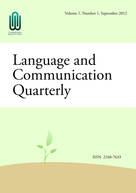


Volume 10 Issues 1-4 (2021-12-31)
Volume 9 Issues 1-4 (2020-12-31)
Volume 8 Issues 1&2 (2019-06-30)
Volume 7 Issues 3&4 (2018-12-31)
Volume 7 Issues 1&2 (2018-06-30)
Volume 6 Issues 3&4 (2017-12-31)
Volume 6 Issues 1&2 (2017-06-30)
Volume 5 Issues 3&4 (2016-12-31)
Volume 5 Issues 1&2 (2016-06-30)
Volume 4 Issues 3&4 (2015-12-31)
This experimental study addresses specifically one category of vocabulary – lexicalized causative verbs in Chinese EFL students’ writing. It examines the effect of recognition and application activities on students’ use of lexicalized causative verbs in writing. Learners at low English proficiency level were found to overuse “Make+ Object+ Complement” structure in their writing and the contrastive analysis can help students improve the writing quality.
Storytelling and learning are inextricably intertwined because the process of composing a story is also a process of making meaning. Integrating opportunities for “storytelling” into academic content knowledge development strengthens student learning (Matthews-DeNatale, 2008). In this paper, the authors explore the power of digital storytelling in second language learning and teaching through the implementation of digital storytelling as an innovative pedagogical practice for advancing the preparation of teacher candidates in ESOL teacher training courses, and how this has been successfully translated into best practices in an ESL classroom. In K-12 classroom practice, digital storytelling was implemented in an ESL classroom as an integrated approach to second language learning and academic knowledge development. The authors discuss the implications of digital storytelling as a powerful pedagogical tool to become reflective, engaging, collaborative, and competent users of their knowledge of content and technology for both TESOL teacher candidates and English language learners.
The 4th Untested Ideas International Research Conference Building Global Connections in Research and Practice